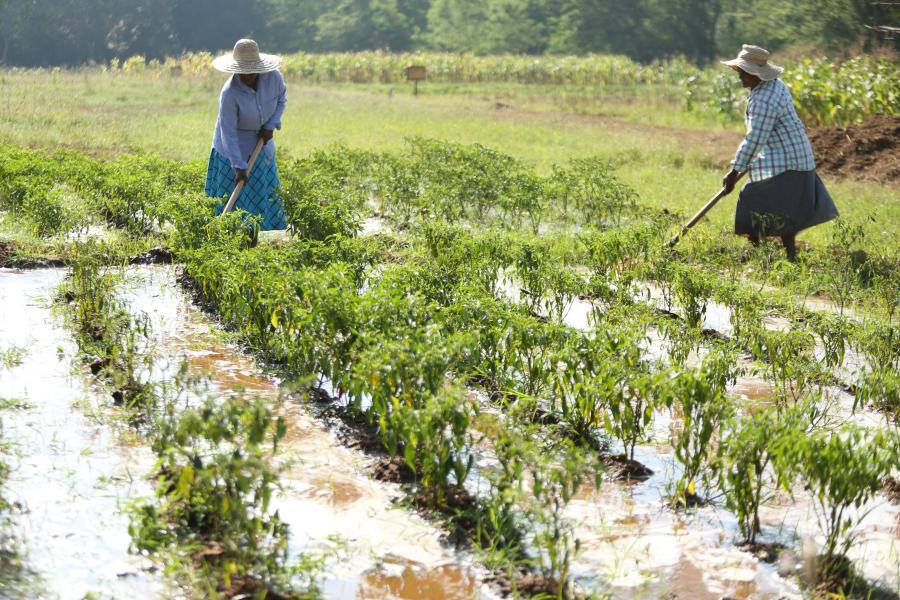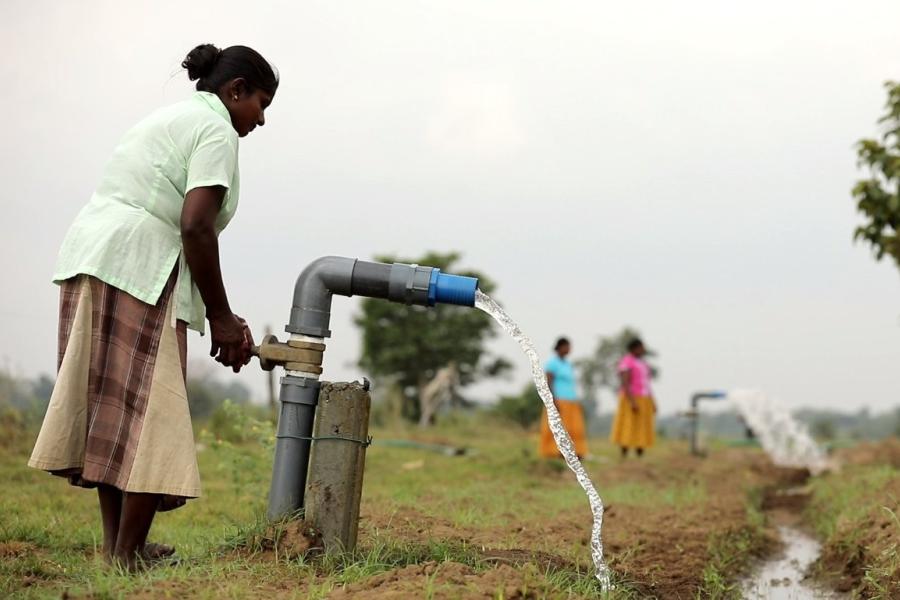Water as a Gamechanger for Sustainable Recovery in Sri Lanka
World Water Day 2023: Why water action makes a difference
Water is a fundamental part of all aspects of life, and can be a gamechanger for poverty reduction, health and wellbeing. It is inextricably linked to sustainable development, including social, cultural, economic and political indicators. The importance of water is reflected in Sustainable Development Goal 6 (SDG6); which aims to ensure that clean water and safe sanitation can be accessed by all.
Several studies have shown that SDG6 has a significant positive impact on other SDGs. For instance, a report by the United Nations Educational, Scientific and Cultural Organization (UNESCO) outlines how the successful implementation of SDG6 could lead to progress in achieving other SDGs. Similarly, the World Health Organization (WHO) found that providing universal access to water could prevent 842,000 deaths annually by reducing poverty and hunger and improving education, health, and gender equality. Moreover, the 2021 SDG6 Progress Report by UN-Water also highlights the interlinkages between SDG6 and other SDGs, emphasizing the important role that water plays in efforts toward sustainable development.
However, the benefits of water can only be fully realized through effective and safe management of water resources and sanitation. Hygiene facilities and awareness-raising can be lifesaving, highly cost-effective health interventions, without which infectious diseases are more likely to spread with a potential to significantly increase infant and child mortality. As of 2022, SDG6 is currently furthest off-track of all the Sustainable Development Goals, as approximately 3.6 billion people lack safely managed sanitation services. At the current rate, UN-Water predicts that 1.9 billion people will still lack facilities to wash their hands at home by 2030.
Addressing water, sanitation and hygiene concerns amid the economic crisis in Sri Lanka
In Sri Lanka, significant progress has been made towards the advancement of SDG6 in the past decade. In 2022, however, the concurrent challenges posed by the ongoing economic crisis resulted in an acute shortage of water treatment and water testing chemicals, which has negatively affected water treatment services. In addition, prolonged power cuts reduced the number of water-pumping hours and compromised operations and maintenance.
As a result, an estimated 2.6 million people in urban, estate and rural areas did not have adequate or regular access to safe drinking water sources at the outset of the crisis, and nearly 50 per cent of households in the country were not able to practice water treatment methods such as boiling or chlorinating. With limited gas available with which to cook food, many households opted to stop treating water, significantly increasing their exposure to water-borne diseases.
A key element of the Humanitarian Needs and Priorities plan, the UN’s response aimed at addressing 1.7 million of the most vulnerable people in urgent need of humanitarian assistance in Sri Lanka, was ensuring access to safe drinking water. Provision of water purification supplies and support to improve water treatment systems in urban and rural areas became a key priority in the response strategy, which itself targeted 375,609 people.
As part of UN-led interventions, over 31,450 people are currently being provided with safe drinking water thanks, in part, to chlorinators that have been installed in rural water supplies. Recognizing safe drinking water as a vital component for food security, water treatment systems played an essential role in the effort to prevent and treat severe acute malnutrition.
Leading the UN’s efforts on water, sanitation and hygiene (WASH), the United Nations International Children’s Emergency Fund (UNICEF) collaborated with provincial councils to protect catchment areas of drinking water sources and supported preliminary data analysis of the national-level household water quality assessment. As a result of awareness-raising initiatives, hygiene-related knowledge of 15,000 people from vulnerable groups was improved through handwashing promotion programmes. As of early 2023, the cumulative humanitarian response in the WASH sector has reached 804,600 people.
Remaining water challenges in Sri Lanka
Beyond the immediate humanitarian needs related to the economic crisis, Sri Lanka faces several looming challenges related to WASH. Climate change is likely to alter the timing and duration of seasonal precipitation, which adversely affects water availability. Due to existing vulnerabilities in the country’s water infrastructure and security, increased climate unpredictability will inevitably have devastating consequences to livelihoods, especially in sectors like agriculture. As a country highly susceptible to extreme weather events such as prolonged droughts and floods, Sri Lanka is already seeing significant drops in crop production and a rapid increase in food security among rural households. This is a particular concern for Sri Lanka’s dry zone, which accounts for two-thirds of the country and over 70 percent of paddy production.
Further, only 60 percent of Sri Lankans have access to pipe borne water. Although the remaining population can access basic water through protected dug wells, rainwater harvesting systems and nearby public point sources, these methods become increasingly precarious amid prolonged bouts of drought. As rural water supply schemes (WWS) are threatened by multiple climate risks such as flash floods, droughts, landslides, and salinity intrusion; the water safety of marginalized rural communities which rely on WWS are severely affected.
Limitations on access to drinking water also put pressure on the household burdens of women, which risks widening existing inequalities. In this context, solutions targeted at building water resilience and climate change adaptation is becoming increasingly important, as these serve as catalysts for multiple social, economic, and environmental development indicators.

Building climate-resilient water supply systems in Sri Lanka
To address these challenges, UNICEF focuses efforts on long-term capacity building within the community water supply sector. In 2022, over 120 development officers, engineers, and plumbers were trained on improving the operation of rural water supply systems, and 48 cost-effective models on climate-resilient water safety and security plans were implemented.
Similar programmes have also been carried out by other UN agencies including the United Nations Development Programme (UNDP), which has trained 390 government officials on Rural Water Safety Plans and assessment of household water quality. In 2022, UNDP also supported 10,400 people in 17 women-led water safety and security initiatives, and in developing guidelines for climate change adaptation for irrigation specialists. In addition, WHO conducted trainings of 150 personnel and a host of auditors from the national water and engineering authorities on water safety.
As part of the KnoWat Project, the Food and Agriculture Organization of the United Nations (FAO) conducts water accounting and auditing assessments and carries out water productivity studies to enhance knowledge around water among relevant stakeholders. In turn, FAO facilitates the development of policies that aim to ensure equitable water allocation for better livelihoods, food security and healthy ecosystems in Sri Lanka.

The Water Action Agenda
As the multi-dimensional crisis in Sri Lanka has illustrated, access to clean water can have a considerable impact on the ability of the most vulnerable groups to meet their nutritional needs during severe shortages of fuel and essential goods. Amid growing global pressures on the quality and quantity of water, water scarcity and unpredictability induced by a changing climate will inevitably affect millions of people around the world.
This week, the UN 2023 Water Conference is bringing together stakeholders to address challenges surrounding water. The Conference serves as a unique opportunity to raise awareness around the global water crisis and promote collective water action. A main outcome of the Conference will be the Water Action Agenda, which is comprised of voluntary commitments collected from stakeholders such as UN Member States, non-governmental organizations, and scientific institutions to accelerate progress on the Water Action Decade 2018-2028 and the 2030 Agenda.
In a wave of change for water, every drop counts. This World Water Day, UN-Water calls on each of us to accelerate change by learning about the personal commitments that each of us can make in order to contribute to solving the water and sanitation crisis.

